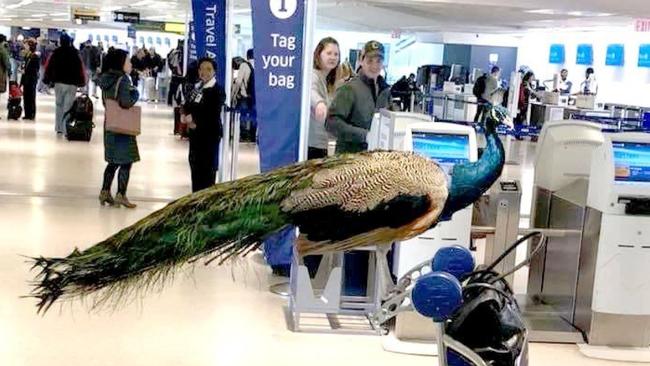American airlines lobby for less animals on flights
Flight crews in the US feel overwhelmed by a surge in ‘emotional support’ pets.

Airlines have had it with emotional support animals. US carriers are urging regulators to change the rules for flying with service animals. They say a surge in untrained pets accompanying passengers is proving unmanageable.
The US Department of Transportation has agreed to revisit those rules. In comments to the department intended to help shape that decision, airlines say existing guidelines force them to accommodate a menagerie of critters that too often are poorly behaved, hurt passengers or leave messes for crew members to clean up. “The regulations are unnecessarily broad and easily abused,” American Airlines Group says in its letter to the department. “People have been bitten, licked, jumped on and growled at; aisles have been blocked, and animals have urinated and defecated on our aeroplanes.”
Carriers want the department to draw a distinction between trained service dogs that assist people with psychiatric or physical disorders, and animals that provide more passive emotional support.
Airlines, passengers and advocacy groups have been fighting over that distinction for years. Carriers don’t charge additional fees to passengers who travel with service animals or animals that provide emotional support. Flying with pets, meanwhile, can cost $US125 ($167) or more for animals that travel in the cabin or in the cargo hold.
Some airlines have added their own restrictions. Earlier this year Delta Air Lines and United Continental began requiring people seeking to fly with support animals to provide extra documentation and pledges that their animals would behave during the flight. United reviewed its pet transport policies more comprehensively after the death of a dog on a flight in March called attention to the airline’s procedures for transporting animals.
Carriers say passengers are taking advantage of the agency’s broad definition of a service animal. Many passengers, they say, obtain “emotional support” certification for their pet from overly permissive online agencies or dress them up in official-looking vests to obtain free passage.
Some passengers, meanwhile, say emotional support status for their pets is critical to getting them through their flights.
Holly Lipschultz, who lives in Chicago, brings her miniature schnauzer, Pepper, with her on flights to manage her anxiety and post-traumatic stress. She carries a letter from a therapist explaining how Pepper helps. “Having someone else to think about and take care of and hold helps,” she says.
Some airline employees seem sceptical of Pepper’s qualifications, she adds. If the rules are tightened, Lipschultz, who is also deaf, says she may get him certified as a service animal.
Trade group Airlines for America estimates the number of emotional support animals surged to 751,000 last year from 481,000 in 2016. That group and the International Air Transport Association say the surge in support animals has “reached a tipping point”.
The trade associations and their member airlines want the Transportation Department to bring the guidelines in line with the Americans with Disabilities Act, which defines a service animal as a dog that has been trained to perform specific tasks for a disabled person. Airlines say service dogs for psychological or physical disabilities would still qualify, but that such animals would be trained to handle the stress of flying.
The Wall Street Journal


